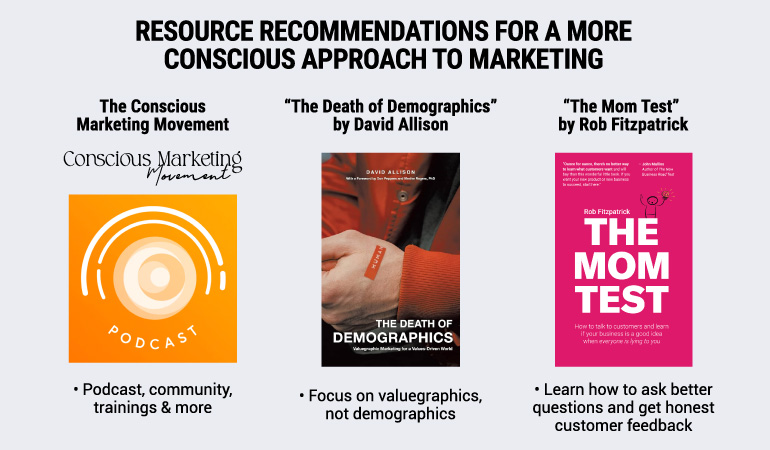Marketing is often described as a numbers game: everything hinges on clicks, conversions, and scale. But what happens when those metrics come at the cost of trust, respect, and real human connection?
As consumer expectations shift and trust becomes a competitive edge, a new wave of marketers is starting to rethink their approach.
One of those marketers is Claudia Guerreiro, social entrepreneur and founder of the Conscious Marketing Movement. With a career that spans global markets and a mission rooted in ethics and impact, she is working to redefine traditional marketing practices.

In this conversation with Brunni Corsato for Usercentrics, Claudia shares practical ways marketers can use to move from manipulative tactics to meaningful engagement. She explores how values-based segmentation outperforms demographics, how internal team dynamics shape the ethics of external messaging, and explains why regulations like the GDPR aren’t blockers, but creative tools for building long-term trust.
_______
Brunni Corsato: You often talk about making marketing more human and less extractive. What does that actually look like in practice for a brand’s day-to-day marketing choices?
Claudia Guerreiro: As humans, we crave genuine connections. It’s a fundamental part of our nature. But strangely, we forget this when it comes to marketing. We are taught to rely on extractive tactics such as shameless self-promotion, tapping into our fears, and creating fake scarcity as the only ways to succeed.
But what if this approach doesn’t sit right with you?
It all starts with intention: not just what you’re selling, but how you’re communicating it, and why. Marketers and communicators hold incredible power. The choices we make — even the small, everyday ones — shape how people see the world and themselves.
Conscious Marketing offers a different path that cares for both people and the planet. Instead of triggering impulsive buying, we help people decide what they truly need, promoting responsible consumption and production. This leads to happier customers, positive word-of-mouth, and profit as a result.
Here are a few examples in practice:
- Writing copy that invites rather than pressures
- Educating your audience so they can make informed, confident decisions
- Creating space for people to engage on their own terms, not just squeezing them through a funnel
Trust is the real long-term strategy. When people feel respected, they come back, not just to buy, but to advocate. And that’s where real growth begins.
Brunni: A lot of marketing still operates on a model of persuasion and conversion. How can teams shift toward approaches that prioritize consent, mutual value, and long-term trust?
Claudia: It starts with changing the goal. From getting a “yes” at all costs to helping people make the right decision for them, even if that decision is “not now” or “not this.” That shift alone requires us to rethink how we define success.
As long as we continue to measure success only through clicks, conversions, and short-term sales, we’ll keep reinforcing those same extractive patterns. To move toward more ethical marketing, we need to expand our metrics to include social impact.
What if success wasn’t just about “scaling fast,” but about building trust, meeting real needs, and creating long-term value for people and the planet?
Of course, I don’t have all the answers. We’re still learning, researching, and experimenting with better ways to do this. But what we’ve seen is that when marketing is rooted in consent, transparency, and mutual value, it naturally builds deeper, more lasting connections. And over time, that’s what drives impact, not just short-term spikes in conversion.
“Trust is the real long-term strategy. When people feel respected, they come back.”
Brunni: You’ve worked across different cultures and markets. How does context shape what ethical marketing looks like in practice, and what are some pitfalls to avoid when applying the same playbook to different contexts?
Claudia: I’m originally from Portugal, and over the past decade, I’ve lived and worked in France, the U.K., Cambodia, Singapore, Germany, and Estonia. These days, I work remotely with customers from all over the world.
One of the biggest pitfalls I see is how we still think about audiences. Marketing relies on outdated and overly simplistic labels when it comes to audience segmentation, and that leads to stereotyping. The book The Death of Demographics: Valuegraphic Marketing for a Values-Driven World by David Allison helped me articulate this more clearly. It argues that traditional demographics like age, gender, or income are poor predictors of what people actually care about. Instead, values such as what people believe in, what motivates them, and what they stand for, offer a much more meaningful way to connect.
When we base our marketing on surface-level assumptions, we can’t meaningfully support cultural or societal change. We just keep reinforcing the same old narratives. Worse, we risk alienating people with messages that feel irrelevant, or even harmful.
The real opportunity is to shift our focus from demographics to values. That means listening first, co-creating where possible, and staying deeply curious.
“When marketing is rooted in consent, transparency, and mutual value, it naturally builds deeper, more lasting connections.”
Brunni: What role do internal practices like team diversity, how we brief creatives, or how we measure success play in creating marketing that’s actually non-exploitative?
Claudia: They’re foundational. Conscious Marketing isn’t just about what we say externally. It’s also about the choices we make behind the scenes.
Without a range of lived experiences on the team, it’s easy to create messages that unintentionally exclude, stereotype, or even cause harm. Diversity isn’t just a checkbox. It’s what helps us catch blind spots early and ensure we’re communicating in ways that are inclusive and respectful.
The way we brief our teams matters too. If we’re only focused on conversions, clicks, and short-term sales, then we’re still operating from an extractive mindset, even if the brand values suggest otherwise. Metrics shape behaviour, so we need to rethink what success actually looks like.
Just as importantly, we need to stay connected to the people we’re trying to serve. The more distance there is between us and real customers, the easier it becomes to fall back on old habits and rely on assumptions. That’s why market research is so important.
The book The Mom Test by Rob Fitzpatrick shaped how I think about this. It’s all about asking questions that lead to honest, useful feedback rather than polite answers or false validation. It encourages us to listen for what people actually do, not just what they say they like, and to avoid leading or biased questions that confirm our own assumptions.
It’s a great reminder that good marketing starts with listening.
Learn how to optimize consent rates as a way to build trust and give users autonomy.
Brunni: Value-based regulations are often seen as constraints, but could they actually be creative guardrails? How have you seen consent and transparency become part of the brand experience itself?
Claudia: I don’t see these regulations as obstacles. I see them as opportunities to raise the standard. When used well, things like the GDPR or cookie consent can become trust-building moments, not just compliance checkboxes.
Some of the most conscious brands I’ve seen use these touchpoints to reflect their tone and values. They explain clearly why they collect data, how it will be used, and how it benefits the user. Instead of interrupting the experience, it becomes part of the experience. It’s an opportunity to demonstrate care, clarity, and respect.

Brunni: What shifts can marketers make today to align their campaigns with a more regenerative, respectful, and privacy-conscious approach, without needing to overhaul everything?
One of the most powerful shifts you can make is simply choosing to explore a different way: to stay curious, challenge the status quo, and connect with others who are on the same journey.
You don’t need to overhaul everything overnight. Sometimes the first shift is simply being in a room where better questions are being asked.
We’ve found there’s a demand for more aligned, ethical ways to approach marketing. Which is why we invite marketers, creatives, and business owners to explore our Conscious Marketing Movement. We’ve developed resources like our podcast, courses, and training programs, and are growing our online community. We cover many of these topics and provide hands-on support for brands to evolve their marketing to be more purpose-driven.
______
Claudia Guerreiro is a social entrepreneur working to change marketing from manipulative to conscious. She believes marketing can be a key driver of systemic change.
As the founder behind the Conscious Marketing Movement, she is on a mission to redefine the field by putting people and the planet first through an approach rooted in ethics, impact, and responsibility.

